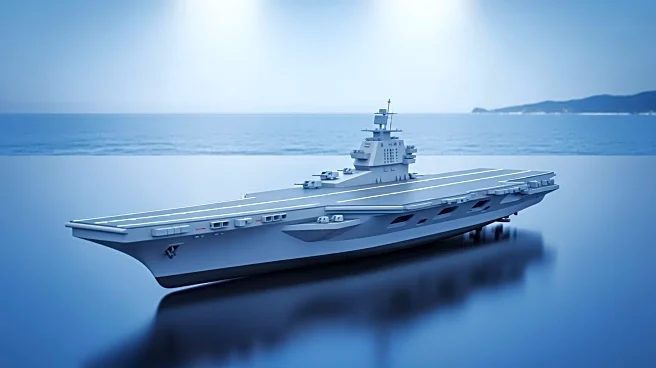What's Happening?
China has officially commissioned its third aircraft carrier, the Fujian, marking a significant step in its naval expansion. The Fujian, which is the first carrier designed and built domestically, was
commissioned at a naval base on Hainan Island in a ceremony attended by Chinese leader Xi Jinping. This development is part of China's broader military modernization strategy aimed at creating a 'world-class' force by mid-century. The Fujian features advanced electromagnetic catapult systems, allowing for the launch of heavier aircraft, and is seen as a move to close the gap with the U.S. Navy. The carrier's commissioning follows a recent military parade showcasing China's advanced weaponry, signaling its strategic intent to project power beyond its coastal waters.
Why It's Important?
The commissioning of the Fujian represents a strategic shift in China's military capabilities, particularly in its ability to project power in the Indo-Pacific region. This development is significant as it challenges U.S. naval dominance and could alter the balance of power in the region. The Fujian's advanced technology, including its electromagnetic catapult system, enhances China's ability to operate in distant waters, potentially impacting U.S. military strategy and alliances in the region. The move is likely to prompt responses from neighboring countries and the U.S., as it underscores China's growing military ambitions and its intent to assert influence in contested areas such as the South China Sea.
What's Next?
China's naval expansion is expected to continue, with potential developments including the construction of additional carriers and advancements in nuclear propulsion technology. The Fujian's commissioning may lead to increased military activity in the Indo-Pacific, prompting strategic adjustments by the U.S. and its allies. Regional powers, particularly Japan and South Korea, are likely to monitor China's military developments closely and may enhance their own defense capabilities in response. The U.S. may also increase its naval presence in the region to counterbalance China's growing influence.
Beyond the Headlines
The expansion of China's naval capabilities raises questions about the long-term implications for global maritime security and the potential for increased tensions in the Indo-Pacific. The development of advanced carriers like the Fujian could lead to an arms race in the region, with countries seeking to bolster their own military capabilities. Additionally, China's naval ambitions may influence its foreign policy, particularly in relation to Taiwan and disputed territories in the South China Sea. The strategic use of carriers could also impact global trade routes and economic stability, as control of key maritime chokepoints becomes increasingly contested.










